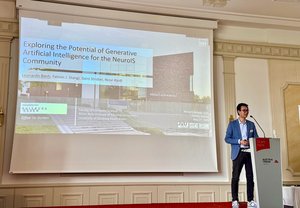Aktuelle Meldung
Sa., 31. Mai 2025
SOFTEC mit zwei Beiträgen auf dem NeuroIS Retreat 2025 vertreten
Wir freuen uns Ihnen mitteilen zu dürfen, dass der Lehrstuhl für Wirtschaftsinformatik und Softwaretechnik (SOFTEC) mit zwei wissenschaftlichen Beiträgen auf dem NeuroIS Retreat 2025 vertreten ist. Die Veranstaltung fand vom 26. bis 28. Mai 2025 in Wien, Österreich statt. Sie gilt als zentrale Plattform für die interdisziplinäre Forschung an der Schnittstelle von Neurowissenschaften und Informationssystemen.
In den beiden Beiträgen beschäftigen sich Leonardo Banh, Fabian J. Stangl, Gero Strobel und René Riedl mit dem Einsatz von generativer künstlicher Intelligenz (GenAI) im Kontext der NeuroIS-Forschung:
Abstract: Generative Artificial Intelligence (GenAI) is transforming human-computer interaction, shaping behavior as well as cognitive and emotional processes. This paper explores how Neuro-Information Systems (NeuroIS) measurements can be applied to the study of GenAI, addressing their role in human-AI interaction. Through a literature review, we identify 21 papers using neurophysiological measurements, including autonomic nervous system (ANS) markers (e.g., eye-tracking), brain imaging (e.g., EEG), and multimodal approaches such as combining eye tracking and EEG. Our findings highlight main research themes, including cognitive offloading, trust, and decision-making biases in human interaction with GenAI. While research on this topic is becoming more prominent, neurophysiological investigations remain limited. We anticipate that measures of brain and ANS system activity, as well as hormone measures, will play an increasing role in future empirical research on GenAI. This study contributes to the advancement of NeuroIS by providing a structured foundation for better understanding the role of GenAI in this research field.
Abstract: Research in Neuro-Information Systems (NeuroIS) integrates neuroscience methods with Information Systems (IS) research to advance our understanding of human-technology interactions. As neurophysiological data collection methods evolve, the analysis of large and complex data sets remains a significant challenge. Generative Artificial Intelligence (GenAI) offers new opportunities for NeuroIS by improving data analysis, experimental design, and interpretation of neural patterns. This paper systematically reviews 56 studies applying GenAI in NeuroIS and identifies five main research themes: (1) GenAI for Autonomic Nervous System Measurements, (2) GenAI for Brain Research, (3) GenAI for General Applications, (4) GenAI for Genetics, and (5) GenAI for Multimodal Approaches. Our findings highlight how GenAI improves data interpretation, integration, and processing while streamlining the use of research methods. Overall, this review underscores the transformative potential of GenAI in NeuroIS, paving the way for scalable, precise, and dynamic research methodologies in the field.
Im Rahmen der Konferenz wurden die Forschungsbeiträge von unserem Mitarbeiter Leonardo Banh in der Präsentation “Exploring the Potential of Generative Artificial Intelligence for the NeuroIS Community” dem Fachpublikum vorgestellt. Zuvor konnte er beim Trainingskurs des NeuroIS Retreat Pre-Events teilnehmen und einen spannenden Perspektivenwechsel für die eigene Forschung erlangen. Wir bedanken uns bei den Konferenzorganisatoren für die gelungene Veranstaltung!
Aktuelles:
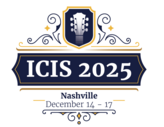 SOFTEC mit Beitrag zur GenAI-Nutzersimulation auf ICIS 2025 vertreten04.11.25
SOFTEC mit Beitrag zur GenAI-Nutzersimulation auf ICIS 2025 vertreten04.11.25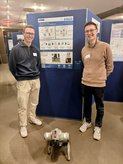 SOFTEC beim Tag der Informatik 2025: Forschung zu Compassionate AI vorgestellt30.10.25
SOFTEC beim Tag der Informatik 2025: Forschung zu Compassionate AI vorgestellt30.10.25 Studienprojektthemen für das WS25/26 jetzt online30.09.25
Studienprojektthemen für das WS25/26 jetzt online30.09.25 SOFTEC erfolgreich auf der WI 2025 in Münster vertreten: Beitrag gewinnt Best Student Paper Award19.09.25
SOFTEC erfolgreich auf der WI 2025 in Münster vertreten: Beitrag gewinnt Best Student Paper Award19.09.25 Rückblick auf das UDE-Sommerfest 2025 - Wirtschaftsinformatik zum Anfassen beim SOFTEC-Lehrstuhl30.06.25
Rückblick auf das UDE-Sommerfest 2025 - Wirtschaftsinformatik zum Anfassen beim SOFTEC-Lehrstuhl30.06.25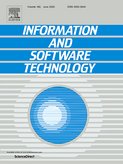 Artikel im Information and Software Technology-Journal veröffentlicht21.04.25
Artikel im Information and Software Technology-Journal veröffentlicht21.04.25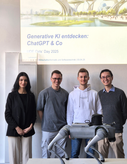 Girls'Day 2025: Schülerinnen entfesseln die Power von Generativer KI05.04.25
Girls'Day 2025: Schülerinnen entfesseln die Power von Generativer KI05.04.25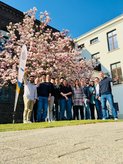 Erfolgreicher 1. Paper-a-Thon des WI Research Clubs22.03.25
Erfolgreicher 1. Paper-a-Thon des WI Research Clubs22.03.25 SOFTEC auf der ICIS 2024 vertreten: Beitrag ausgezeichnet und für Best Paper Award nominiert18.12.24
SOFTEC auf der ICIS 2024 vertreten: Beitrag ausgezeichnet und für Best Paper Award nominiert18.12.24 Studienprojektthemen für das WS24/25 jetzt online!26.09.24
Studienprojektthemen für das WS24/25 jetzt online!26.09.24

